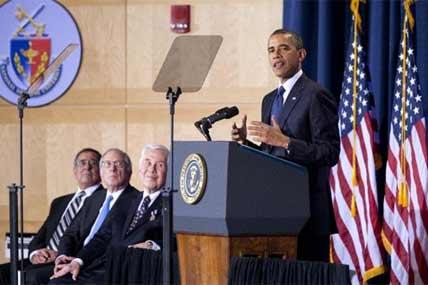President Obama warned President Bashar al-Assad on Monday of possible U.S. military action if Syria uses chemical weapons against resurgent rebel forces now pressing on Damascus.
"There will be consequences and you will be held accountable," Obama said in a reference to Assad following reports that the Syrian military could be mixing precursor agents to form deadly Sarin nerve gas.
"We will continue to support the legitimate aspirations of the Syrian people" to topple Assad, Obama said. The threat of the use of weapons of mass destruction by the Damascus regime would strengthen the resolve of the allies in backing the Free Syrian Army, Obama explained.
"We can't allow the 21st Centruty to be darkened by the worst weapons of the 20th Century," Obama said in a reference to the vast stores of chemical and biological weapons believed to be in the Syrian arsenal.
Earlier, news agencies quoted U.S. officials as saying that the Syrian regime had begun mixing chemicals to make Sarin.
"We are concerned that an increasingly beleaguered regime may be considering the use of chemical weapons against the Syrian people," White House Press Secretary Jay Carney said.
Both the U.S. and Israel have previously reported detecting signs that Syrian forces had moved chemical weapons out of storage, and both nations warned of possible military action to stop their use.
Obama spoke at a National Defense University forum at Fort McNair in Washington, D.C., on the 20th anniversary of the Cooperative Threat Reduction program to disarm nuclear weapons in the former Soviet Union and prevent the spread of "loose nukes" to rogue states and terrorists.
Russia has announced intentions to let the program expire next spring "to which we say, let's update it," Obama said.
"I'm optimistic that we can," Obama said.
The CTR program, often called the Nunn-Lugar Treaty after former Sen. Sam Nunn (D-Ga.) and outgoing Sen. Richard Lugar (R-Ind.), was passed by Congress in 1992 with the stated intent "to secure and dismantle weapons of mass destruction and their associated infrastructure in former Soviet Union states."
The operating arm of Nunn-Lugar, the Defense Threat Reduction Agency, has worked to dismantle nuclear warheads in former Soviet states and then destroy or stockpile them at designated sites in Russia.
Russia's government announced in early October that it would not renew the 20-year-old, $8 billion disarmament program when it comes up for renewal in the spring. Nunn-Lugar has been credited with deactivating more than 7,600 strategic nuclear warheads.
Russian President Vladimir Putin has said that he is willing to cooperate on nuclear disarmament but his main priority was to stop the deployment of the planned U.S. missile defense shield in Europe. The U.S. has stressed that the missile shield was aimed at rogue states such as Iran, but Putin sees it as a threat to Russia.
Last March, at a forum in South Korea, President Obama was overheard telling then-Russian President Dmitry Medvedev that he would have more flexibility on the missile defense issue after November.
"This is my last election. After my election, I have more flexibility," Obama said in remarks picked up by an open microphone that became fodder for Republicans in the election campaign.
The original plan for the European defense shield under the administration of former President George W. Bush called for interceptor missiles to be placed in Poland and advanced radars in the Czech Republic. Obama overhauled the plan, which now calls for the use of U.S. Aegis missile destroyers and cruisers in the Mediterranean in combination with land-based systems in Romania.



























